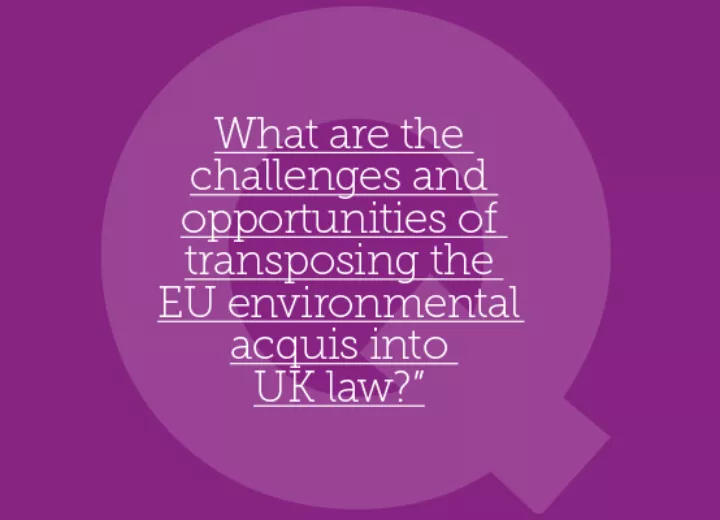Martin Baxter, Chief policy advisor at IEMA
“Any deviation will shove the burden onto regulators, businesses and professionals”
What we need right now is certainty. The UK has been without comfortable levels of certainty for well over a year and this limits businesses’ ability to plan and perform for the long term.
Not knowing which way the legislative and regulatory wind will blow creates business risk, and, because big organisations can choose where in the world they conduct their business, the lack of long-term clarity could lead them to take their investment elsewhere.
Legislative uncertainty also affects the UK’s ability to meet targets. The Environment Agency has an enormous role to fulfil in protecting and enhancing the UK’s environment every day, but that is currently severely hampered without long-term certainty.
While transposing the environmental acquis is an administrative challenge, it starts and ends with government. Any deviation from this framework will shove the burden and bureaucracy onto regulators, businesses and professionals responsible for environment and sustainability performance.
Having said that, sustainability professionals should have the chance to highlight areas for improvement – but only once we’ve established a baseline.
Transposition is both a challenge and an opportunity, and one we should get on with – quickly!
Sharon Lashley, Director of Enviro UK, Consultants Ltd
“We need to grow our networks and ensure our voice is heard”
As one of the many environment and sustainability professionals delivering projects at grass-roots level every day, I can say there will undeniably be both challenges and opportunities.
The core principles detailed in IEMA’s Brexit and Beyond guidelines underpin our standard delivery plan and a lot of the legislation will and absolutely should remain. But this presents those who deliver policies and regulators such as the Environment Agency an opportunity to finetune some of the legislative areas.
It is crucial that the environmental sector is included in these discussions, and that there is transparency, scrutiny and accountability. More important, there needs to be a focus on working with other agencies to ensure that we are stronger in our representation, that we can grow our networks and that our voice is heard in government.
We absolutely must continue to lead our profession, manage the risks and opportunities of transposition, collaborate with and involve other interested parties, set realistic SMART targets and objectives and be able to monitor and continuously improve.
We inevitably face challenging times, but if we continue to work to our IEMA Brexit and Beyond guidelines and encourage other sectors to recognise these principles, we can not only retain key strategies and legislation but reshape some areas for future improvement.
Prof Andy Jordan
Co-chair of the ESRC-funded Brexit & Environment network
“The risk of slippages and oversights is very real” The referendum and subsequent election have already opened up new political opportunities, in the form of an energetic new secretary of state. Although it sided with the losing side in the referendum, the environmental movement has wisely opted to look forwards. Brexit gives space for new agriculture and fisheries policies. But it also brings huge challenges, the full magnitude of which will become clearer as the Withdrawal Bill inches through.
First, there is so very much to get right. The acquis has many different working parts, including law and policy but also institutions and governance. Second, the legal process of transposition – a highly exacting task – will have to be completed at break-neck speed in London, Belfast, Cardiff and Edinburgh. The risk of slippages and oversights is very real.
Third is acute political uncertainty. The two main political parties can’t agree on a timetable let alone a destination, and that is before the EU 27 and the European Parliament have fully entered the process.
Fourth, environment, fisheries and agriculture are devolved matters. New institutions are needed to deliver common policy frameworks – in a climate of deep political distrust. This may require new levels of flexibility, such as common approaches for all of Ireland.
Unfortunately, deep, comprehensive trade agreements will be no more straightforward to explain to the public than ‘Brussels’.









